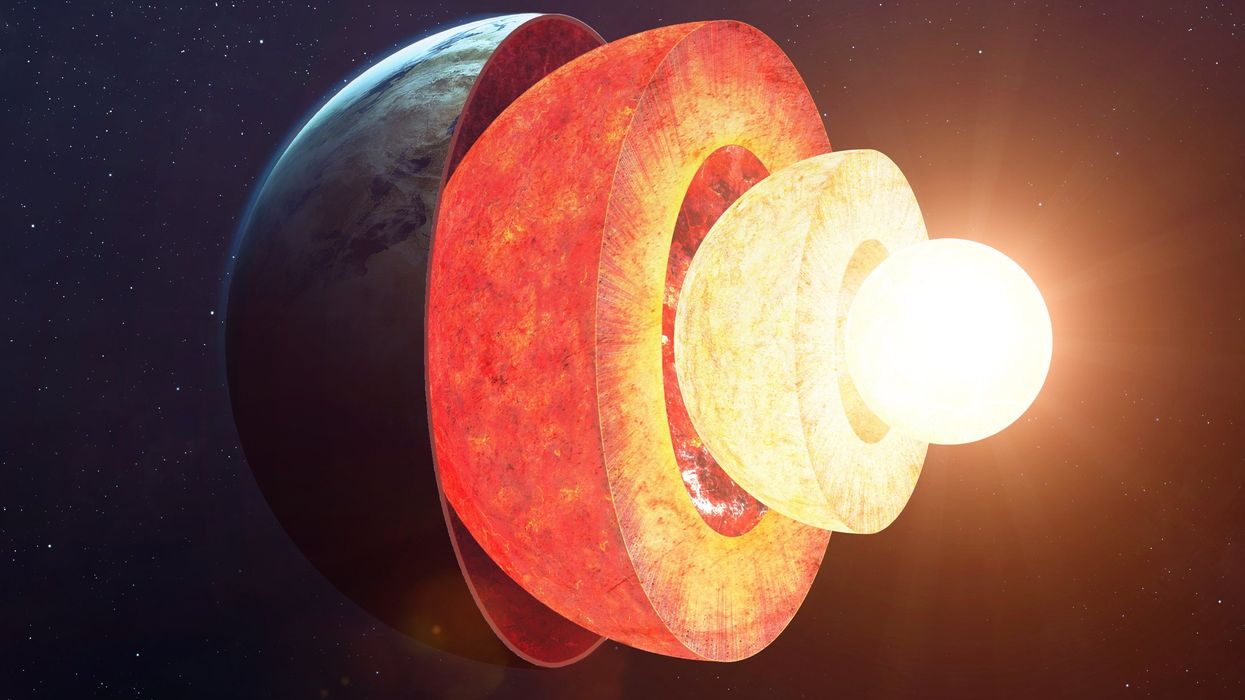
forplayday iStock / Getty Images Plus

Scientists believe a slowing or reversing inner core could potentially affect Earth's magnetic field.
At the center of the Earth lies a solid metal ball that rotates independently of our spinning planet. Scientists have debated the inner core's rotation speed and direction. However, new research points to the inner core varying speed in recent years. However, researchers are not exactly sure if there are any effects from the inner core slowing down or reversing.
Danish seismologist Inge Lehmann discovered the ball-shaped inner core in 1936.
The inner core is buried approximately 3,220 miles deep inside Earth. The solid metal ball is mostly comprised of iron and nickel. The inner core is estimated to reach temperatures as scalding as the surface of the sun – roughly 9,800 degrees Fahrenheit.
According to National Geographic:
The inner core’s intense pressure — the entire rest of the planet and its atmosphere — prevents the iron from melting. The pressure and density are simply too great for the iron atoms to move into a liquid state. Because of this unusual set of circumstances, some geophysicists prefer to interpret the inner core not as a solid, but as a plasma behaving as a solid.
Earth's magnetic field pulls on this ball of hot metal, forcing it to spin. At the same time, gravity and flow of the fluid outer core and mantle also interact with the movement of the inner core.
By analyzing seismographic data, scientists believe the core rotates quicker and slower during a 70-year cycle. A hypothesis proposed in 2023 claimed that the inner care had actually spun faster than Earth itself in the past, but was spinning slower in recent times. The slowdown was so significant that the inner core could even reverse the direction of its spin.
The research discovered the inner core began slowing down around 2008 and slightly reversed direction relative to the mantle by 2023. According to calculations by researchers, the rotation of the inner core will start speeding up again in the next 5 to 10 years.
New research published in the journal Nature on June 12 is said to confirm the core had slowed down significantly. However, scientists are not exactly certain as to what the effects the slowdown or the backward movement could have on the Earth.
There is one theory that a slower-spinning core could fractionally alter the length of a day.
The movement of metal-rich fluid in the outer core generates electrical currents that power our planet's magnetic field, which protects our planet from deadly solar radiation. Scientists believe that a slowing or reversing inner core could potentially affect Earth's magnetic field.
The new study's coauthor Dr. John Vidale – Dean’s Professor of Earth Sciences at the University of Southern California’s Dornsife College of Letters, Arts and Sciences – said the new research "nails it."
Vidale told CNN, “I think we’ve ended the debate on whether the inner core moves, and what’s been its pattern for the last couple of decades.”
Dr. Lauren Waszek – a senior lecturer of physical sciences at James Cook University in Australia – told the outlet, “Differential rotation of the inner core was proposed as a phenomenon in the 1970s and ’80s, but it wasn’t until the ‘90s that seismological evidence was published.”
Waszek noted that more data and "improved interdisciplinary tools to investigate this further" to determine if there are any effects of the slowing inner core.
Waszek did say, “In terms of that effect in a person’s lifetime? I can’t imagine it means much.”
Like Blaze News? Bypass the censors, sign up for our newsletters, and get stories like this direct to your inbox. Sign up here!